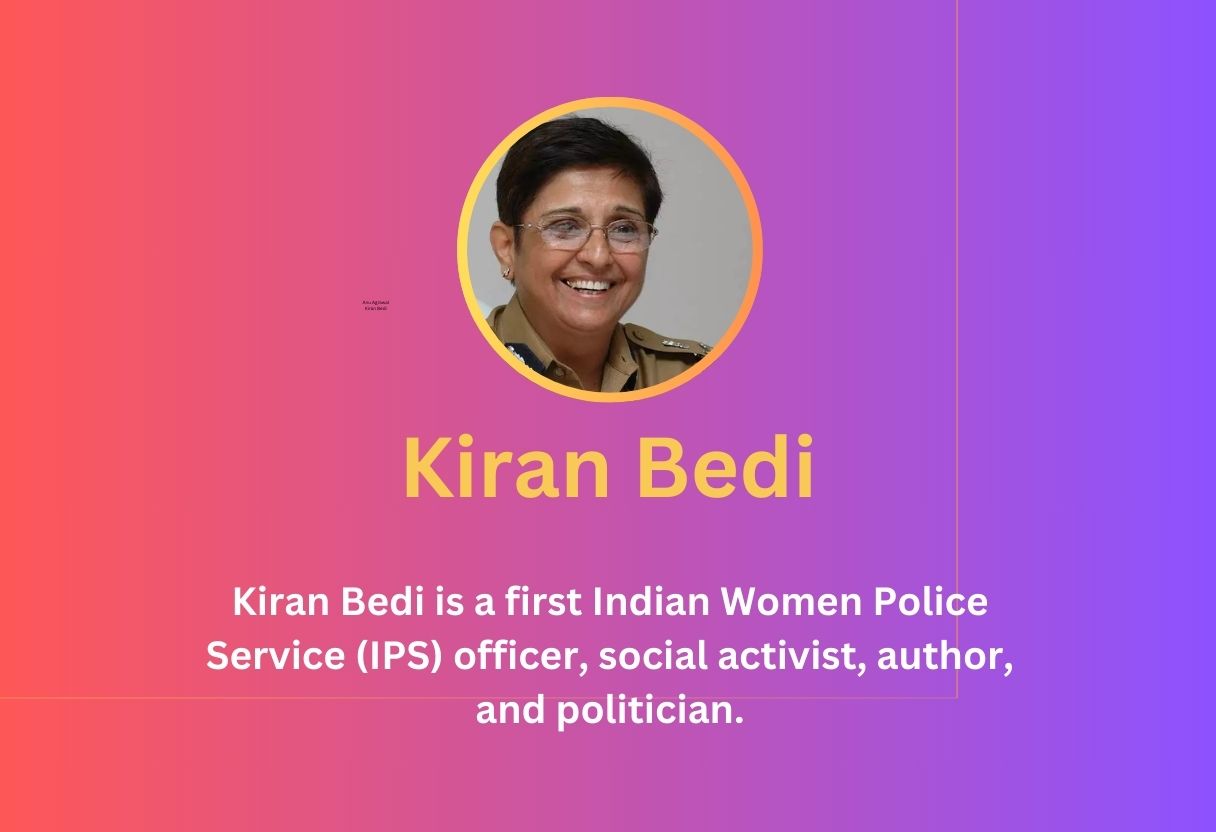Early Life and Childhood
Kiran Bedi was born on June 9, 1949, in Amritsar, Punjab, India, to Prakash Lal Peshawaria and Prem Lata. She grew up in a supportive family that emphasized education and discipline. Her father, who was a progressive thinker, ensured that all his daughters received the same educational opportunities as boys, which was quite uncommon in those times. From a young age, Kiran displayed exceptional leadership skills and a strong sense of justice.
She attended Sacred Heart Convent School in Amritsar, where she excelled academically. Apart from studies, she was actively involved in sports, particularly tennis. Her parents supported her passion, and she went on to win the Junior National Tennis Championship in 1966.
Education and College Life
Kiran Bedi pursued her higher education at Government College for Women, Amritsar, where she earned a Bachelor’s degree in English (1968). Alongside her studies, she continued excelling in tennis and became the Asian Women’s Lawn Tennis Champion. Later, she pursued a Master’s degree in Political Science from Panjab University (1970). Her academic excellence continued, and she went on to complete a Law degree (LLB) from Delhi University in 1988 and a Ph.D. in Social Sciences from IIT Delhi in 1993.
Her achievements in sports and academics laid a strong foundation for her professional journey.
Entry into Civil Services – Becoming India’s First Woman IPS Officer
In 1972, Kiran Bedi created history by becoming India’s first woman officer in the Indian Police Service (IPS). This was a pathbreaking achievement, as the field was dominated by men. Her selection was based purely on merit, and she took it as an opportunity to bring change within the system.
Professional Journey and Challenges
- Beginning of IPS Career (1972-1981)
- Kiran Bedi started her career as an Assistant Superintendent of Police (ASP) in Chanakyapuri, Delhi. Her fearless nature and strict discipline were evident from the beginning. She was known for towing away illegally parked cars, including the vehicle of Prime Minister Indira Gandhi’s office, which demonstrated her dedication to the law.
- Superintendent of Police in Goa (1983)
- She was posted in Goa, where she curbed drug trafficking and introduced strict law enforcement measures.
- Inspector General of Prisons, Tihar Jail (1993-1995)
- One of her most remarkable contributions was transforming Tihar Jail, India’s largest prison, from a hub of corruption and violence into a reformative institution. She introduced meditation programs, education for prisoners, and vocational training, which significantly reduced crime within the prison. This earned her the prestigious Ramon Magsaysay Award for Government Service in 1994.
- Struggles and Challenges
- Throughout her career, Kiran Bedi faced political resistance, opposition from senior officials, and threats due to her strict disciplinary actions. She was transferred multiple times due to her firm stance on corruption. However, she remained undeterred and continued working with integrity.
Achievements and Awards
- President’s Police Medal for Gallantry (1979) – For her fearless service in the Delhi Police.
- Ramon Magsaysay Award (1994) – Asia’s highest honor for her prison reforms.
- United Nations Civilian Police Advisor (2003) – She became the first woman to be appointed as the UN’s civilian police advisor.
- Lions Club Award for Excellence in Public Service (1998).
- Honorary Doctorates from multiple universities for her contribution to society.
Retirement and Social Work
After serving for 35 years, Kiran Bedi voluntarily retired from the IPS in 2007. Post-retirement, she took up various social causes and established the Navjyoti India Foundation and India Vision Foundation to work for the upliftment of underprivileged sections of society.
She also became an author and motivational speaker, inspiring millions with her books and speeches on leadership, governance, and women’s empowerment.
Entry into Politics
In 2015, Kiran Bedi joined politics and was appointed as the Lieutenant Governor of Puducherry. She served in this role until 2021, implementing reforms in governance and law enforcement. However, political interference often limited her efforts, and she faced challenges in executing her policies effectively.
Personal Life and Family Support
Kiran Bedi married Brij Bedi, a social activist, and businessman, in 1972. He was extremely supportive of her career and social work. The couple shared a deep commitment to public service. Unfortunately, Brij Bedi passed away in 2016.
Legacy and Influence
Kiran Bedi’s life is an inspiration to millions, particularly women who aspire to break barriers in male-dominated fields. Her unwavering commitment to justice, discipline, and social service has left an indelible mark on Indian society.
Conclusion
From a young girl with a dream to becoming India’s first woman IPS officer, Kiran Bedi has paved the way for future generations. Despite facing numerous struggles, her perseverance and dedication have shaped her legacy as a fearless leader and a social reformer. Even today, she continues to inspire people through her words and actions, proving that integrity and courage can drive meaningful change in society.









